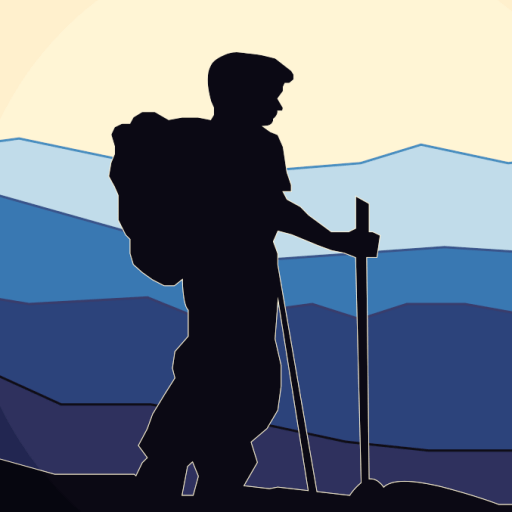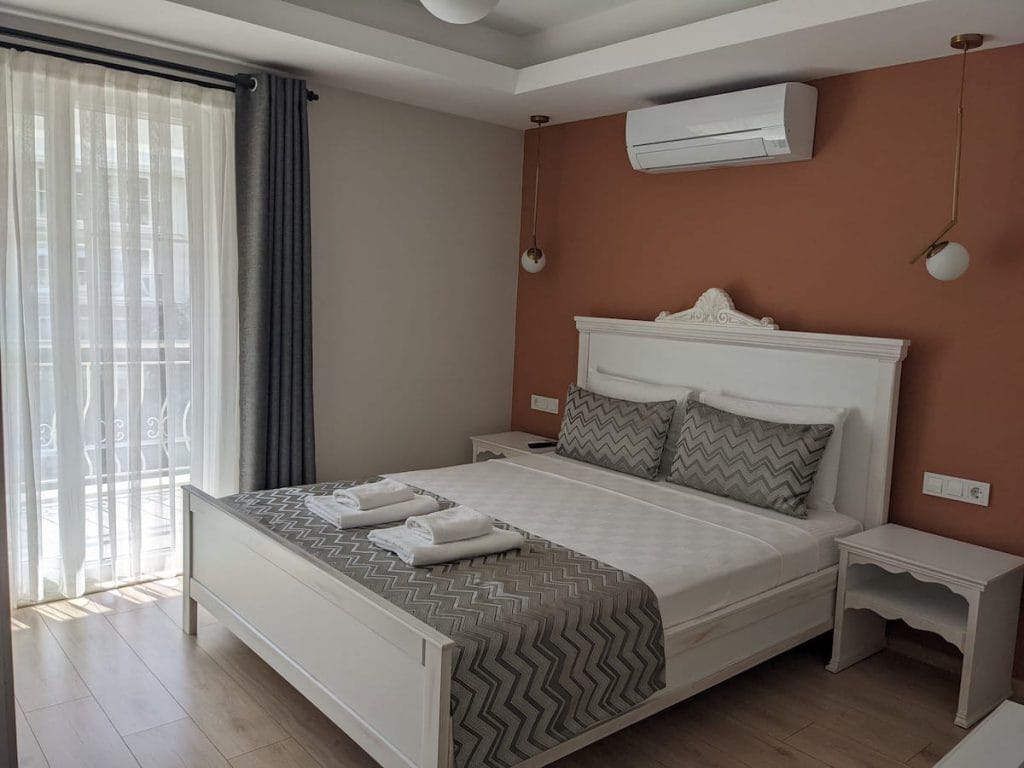
Hotels & Guesthouses
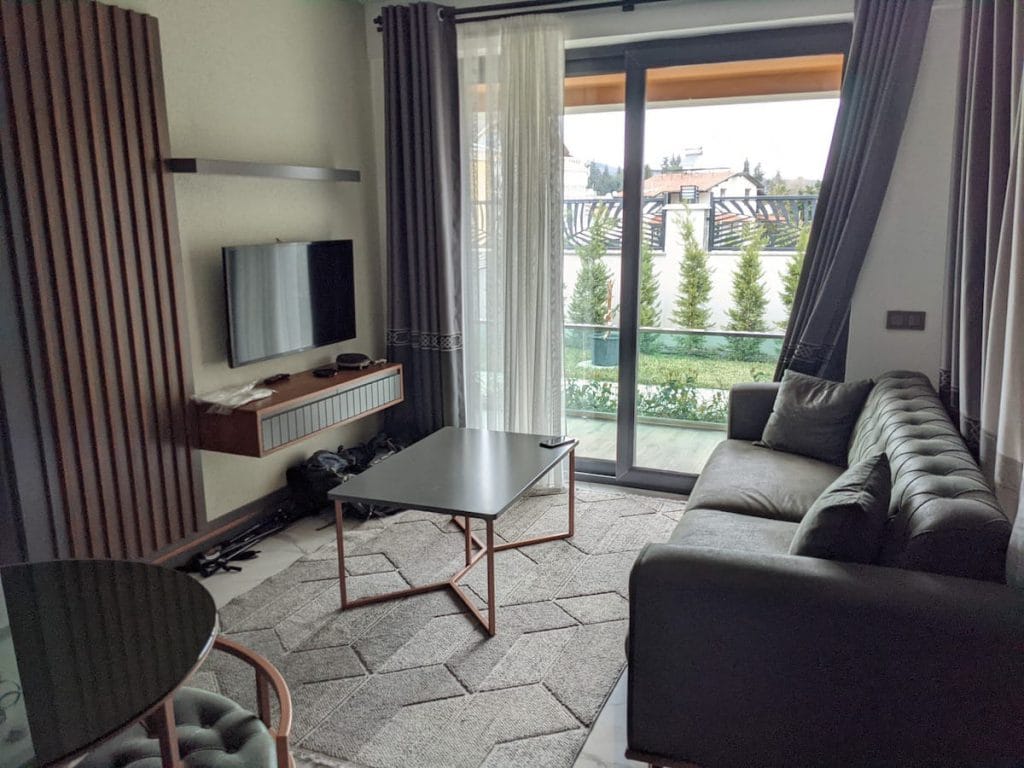
Staying at the Güvenpark Residence & Hotel in Tekirova. Photo by T Roszkowski, spring 2022.
The larger communities, such as Fethiye and Kaş, have traditional hotels and a full range of other accommodation options. Throughout Turkey, though, including in the majority of villages, you’ll also find excellent pensions (“pansiyons” in Turkish). These guesthouses can be formal establishments comparable to a Bed & Breakfast, or they can be completely informal, such as a family that simply makes a couple of rooms available in their home and shares their meals with you.
Depending on your travel style, these informal family-style pensions are often a highlight of the trip – true Turkish hospitality is a joy to experience and staying with these (usually) charming, warm, friendly families is a great way to be exposed to that hospitality.
The Lycian Way has become established enough now that there are almost always accommodations regularly available throughout the trek. The notable exception is the long multi-day stretch through the mountains between Demre (Myra) and Finike for which wild camping is typically the only option, though those sections can easily be skipped (and, as noted further below, can actually still be done without camping if you are willing to put in a bit of extra planning effort).
We list many great options linked to each community or route section, though there are many more available in most places. As the Lycian Way gains in awareness, the infrastructure to support it is equally growing – new guesthouses (not to mention tour operators, and so on) are popping up all the time. The logistics associated with trekking the Lycian Way are becoming much simpler.
Ask around. Don’t be shy about simply asking about accommodation when coming to a village – even when you already know that none is supposed to be available. Head to the village’s mosque and ask there. Or ask for the village headman (“muhtar” – somewhat equivalent to ‘mayor’). Quite often (very often, frankly), they’ll find you somewhere to stay with a local family at a very reasonable rate. Even if you don’t speak Turkish, ask anyway. Use a combination of your phrase book, gestures, and a smiling but plaintive expression and people will figure out what you are looking for. (Well, usually. that is.. There was this one time when your humble author was led by a very nice man to the toilet in his home – apparently my expression was a little too plaintive and my need was misconstrued… alas!)
Note: If you are expecting to need to over-night in a remote village where limited accommodation might be available, consider asking your host at your prior guesthouse to call ahead on your behalf and make a reservation or at least confirm availability.
Depending on your travel style, these informal family-style pensions are often a highlight of the trip – true Turkish hospitality is a joy to experience and staying with these (usually) charming, warm, friendly families is a great way to be exposed to that hospitality.
The Lycian Way has become established enough now that there are almost always accommodations regularly available throughout the trek. The notable exception is the long multi-day stretch through the mountains between Demre (Myra) and Finike for which wild camping is typically the only option, though those sections can easily be skipped (and, as noted further below, can actually still be done without camping if you are willing to put in a bit of extra planning effort).
We list many great options linked to each community or route section, though there are many more available in most places. As the Lycian Way gains in awareness, the infrastructure to support it is equally growing – new guesthouses (not to mention tour operators, and so on) are popping up all the time. The logistics associated with trekking the Lycian Way are becoming much simpler.
Ask around. Don’t be shy about simply asking about accommodation when coming to a village – even when you already know that none is supposed to be available. Head to the village’s mosque and ask there. Or ask for the village headman (“muhtar” – somewhat equivalent to ‘mayor’). Quite often (very often, frankly), they’ll find you somewhere to stay with a local family at a very reasonable rate. Even if you don’t speak Turkish, ask anyway. Use a combination of your phrase book, gestures, and a smiling but plaintive expression and people will figure out what you are looking for. (Well, usually. that is.. There was this one time when your humble author was led by a very nice man to the toilet in his home – apparently my expression was a little too plaintive and my need was misconstrued… alas!)
Note: If you are expecting to need to over-night in a remote village where limited accommodation might be available, consider asking your host at your prior guesthouse to call ahead on your behalf and make a reservation or at least confirm availability.
Wild Camping
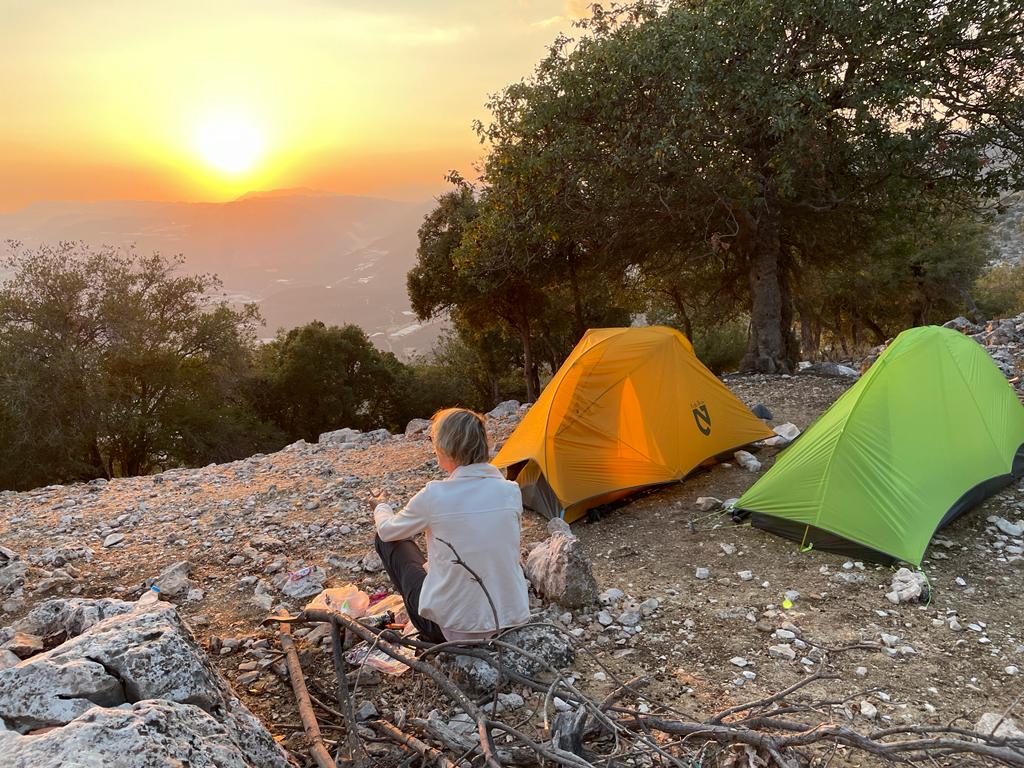
Campsite with a nice view. Photo by Irene Dijkmans, fall 2022.
Many people prefer to camp, both to keep costs down and for the considerable freedom and flexibility it provides. Luckily, the Lycian Way is great for camping!
Camping is easy and safe, with lots of places you can pitch your tent (no need for formal campgrounds). That said, there are also many long stretches where it can be difficult to find a sufficiently flat surface upon which to pitch your tent. In the descriptions for each section, we try to note the availability of camping locations. Where possible, we have marked specific places or regions that are good for camping. In some sections we have simply described the general availability (when you find good camping locations, please send us the coordinates and notes about the spot, and a photo if possible!).
The advantage of camping, of course, is the much greater freedom it gives you – you can choose to stop when and where you want, subject only to there being a suitable place to pitch your tent. It also allows you to stop in the most scenic of places, often far from everyone. The downside, though, is you have to carry much more gear. The added weight definitely adds up over such a long distance and especially when you consider the many steep ascents and descents you’ll be doing.
If you are going to do camping, make sure your tent has good netting – mosquitos can be quite bad in some areas, though overall they aren’t too bothersome. At higher altitudes you’ll often not see them at all. The season also makes a difference.
Tip: Be aware that Turkey seems to be switching to screw-type gas canisters though you’ll still see the push-type canisters in places.
Tip: If camping at all, carry a good quality groundsheet – you’ll often have to camp on rough ground and/or with pine needles, etc. beneath you.
Caution: Many excellent camping sites are near cliff edges or on hilltops. If conditions are windy or if a storm is anticipated, you may want to search out an alternate location.
Important: Sometimes the local authorities can have bans on wild camping when there are risks of forest fires. These bans can be set at the district and/or provincial level and thus there can be different restrictions on different parts of the trail. Usually commercial campgrounds are unaffected (shockingly, the rates at commercial campgrounds inevitably increase as soon as the wild camping bans are announced… ). Check with the local police if you are unsure of the current regulations. Police can issue non-trivial fines if you are caught wild camping during a ban, though from what we’ve heard police mostly just seem to warn campers about the ban and require them to move to a commercial campground.
Camping is easy and safe, with lots of places you can pitch your tent (no need for formal campgrounds). That said, there are also many long stretches where it can be difficult to find a sufficiently flat surface upon which to pitch your tent. In the descriptions for each section, we try to note the availability of camping locations. Where possible, we have marked specific places or regions that are good for camping. In some sections we have simply described the general availability (when you find good camping locations, please send us the coordinates and notes about the spot, and a photo if possible!).
The advantage of camping, of course, is the much greater freedom it gives you – you can choose to stop when and where you want, subject only to there being a suitable place to pitch your tent. It also allows you to stop in the most scenic of places, often far from everyone. The downside, though, is you have to carry much more gear. The added weight definitely adds up over such a long distance and especially when you consider the many steep ascents and descents you’ll be doing.
If you are going to do camping, make sure your tent has good netting – mosquitos can be quite bad in some areas, though overall they aren’t too bothersome. At higher altitudes you’ll often not see them at all. The season also makes a difference.
Tip: Be aware that Turkey seems to be switching to screw-type gas canisters though you’ll still see the push-type canisters in places.
Tip: If camping at all, carry a good quality groundsheet – you’ll often have to camp on rough ground and/or with pine needles, etc. beneath you.
Caution: Many excellent camping sites are near cliff edges or on hilltops. If conditions are windy or if a storm is anticipated, you may want to search out an alternate location.
Important: Sometimes the local authorities can have bans on wild camping when there are risks of forest fires. These bans can be set at the district and/or provincial level and thus there can be different restrictions on different parts of the trail. Usually commercial campgrounds are unaffected (shockingly, the rates at commercial campgrounds inevitably increase as soon as the wild camping bans are announced… ). Check with the local police if you are unsure of the current regulations. Police can issue non-trivial fines if you are caught wild camping during a ban, though from what we’ve heard police mostly just seem to warn campers about the ban and require them to move to a commercial campground.
Commercial Campsites
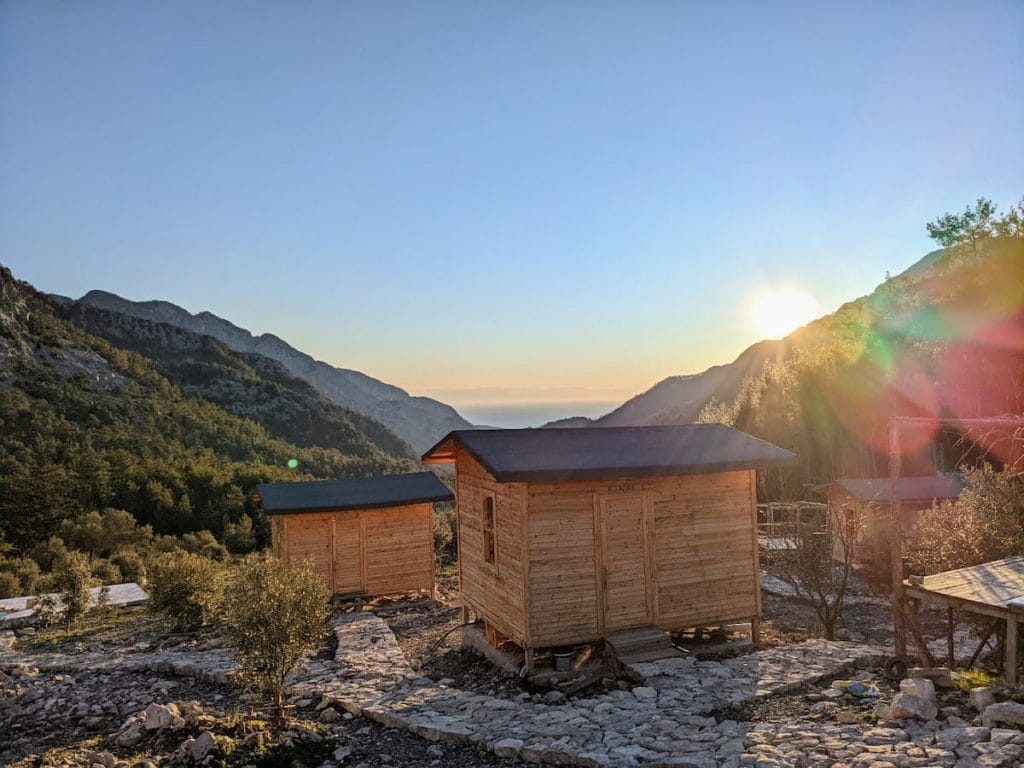
Beautiful morning at Doga Camping & Bungalows between Göynük Yayla & Göynük Canyon. Photo by T Roszkowski, spring 2022.
Commercial campgrounds are fairly common along the Lycian Way, especially near most ‘touristy’ areas though some are available in remote locations. As you’d expect, showers and toilets will be available. Some also offer meals and provide charge stations to power-up your devices.
Turkish campgrounds typically provide sites where your tent is pitched on a wooden platform (which is often covered / shielded to varying degrees and frequently raised off the ground). The raised platforms offer a very helpful insulation advantage since you aren’t directly on the ground. It also enables tents to be pitched in spots that would otherwise be too rocky.
Note: If you normally need to peg your tent down, consider bringing twine with you as well and tying the tent down instead when on platforms. Otherwise, it can be a challenge to set up your tent.
Turkish campgrounds typically provide sites where your tent is pitched on a wooden platform (which is often covered / shielded to varying degrees and frequently raised off the ground). The raised platforms offer a very helpful insulation advantage since you aren’t directly on the ground. It also enables tents to be pitched in spots that would otherwise be too rocky.
Note: If you normally need to peg your tent down, consider bringing twine with you as well and tying the tent down instead when on platforms. Otherwise, it can be a challenge to set up your tent.
Compromise Approach
Some people do a ‘compromise’ approach where they camp sometimes and stay at guesthouses other times. A variation on this is to camp but to do so at guesthouses (thus, sleeping outside but having access to hot showers and to home-cooked meals). Quite a few guesthouses offer this option and others will often agree to it if you simply ask.
Many of those opting for this sort of compromise approach are ultra-light campers. They forego full tents and instead bring bivouac sacks, perhaps with an extra ground sheet pegged as additional cover using walking poles as the structure. They skip cooking gear and most other camping-related gear by eating at guesthouses and in village restaurants. It allows them to travel light while still giving them the flexibility to stay anywhere.
Many of those opting for this sort of compromise approach are ultra-light campers. They forego full tents and instead bring bivouac sacks, perhaps with an extra ground sheet pegged as additional cover using walking poles as the structure. They skip cooking gear and most other camping-related gear by eating at guesthouses and in village restaurants. It allows them to travel light while still giving them the flexibility to stay anywhere.
Supported Trip
Another option is to do a ‘supported’ trip, where you engage a 3rd party company to help you with moving your main pack (so you only have to carry a day pack) and / or to assist with pick-up and drop-off services. Some companies will also handle booking arrangements for you as well.
This soft of assistance can be arranged through a single company that handles logistics for your entire hike or it can be done on a one-off basis just where needed through individual guesthouses (though, of course, not all will be willing to handle baggage transfer or pick-up / drop-off).
This soft of assistance can be arranged through a single company that handles logistics for your entire hike or it can be done on a one-off basis just where needed through individual guesthouses (though, of course, not all will be willing to handle baggage transfer or pick-up / drop-off).
Demre – Finike WITHOUT Camping
Even the 3-day (2-night) mountain trek between Demre and Finike can be done without camping, despite there being no accommodations available along it. It takes a bit of logistical work, though. We have a separate article with details on how to do it.
About Our Accommodations Listings
Our goals when adding accommodation options to Trekopedia are the following:
1. To geo-locate popular or notable places to stay so that you can find them easily at the end of a long, tiring day.
2. To especially focus on places to stay in smaller, more remote communities where it might otherwise be difficult to identify options.
3. To provide helpful contact details.
4. To include links to good review sites wherever we can.
Where possible, we like to include descriptions and a listing of amenities, too — especially things of particular interest to long-distance hikers / cyclists.
IMPORTANT: We receive no payment or other consideration whatsoever from any accommodation provider, restaurant, or other business listed on Trekopedia. All of our content is based on our own first-hand research, experiences, or from feedback received from the hiking & cycling community.
Reviews: We intentionally do not focus on doing reviews or ratings of every place to stay included in Trekopedia. There are lots of places on the Internet that already do a good job of that (better than we ever could). Instead, we try to provide links to the appropriate page in good review sites (such as TripAdvisor) and to popular booking sites (such as booking.com).
Where we’ve had good personal experiences and/or have received consistently good feedback from our users and members of the trail community we will sometimes highlight that in the listing for that accommodation. Some members of the Trekopedia community also post feedback here on this site. Many others email us directly with comments and opinions. The more we get to know someone, the more weight we tend to give to feedback received from them.
You can assist us by sending us your own feedback or by pointing us to online sites with up-to-date reviews.
1. To geo-locate popular or notable places to stay so that you can find them easily at the end of a long, tiring day.
2. To especially focus on places to stay in smaller, more remote communities where it might otherwise be difficult to identify options.
3. To provide helpful contact details.
4. To include links to good review sites wherever we can.
Where possible, we like to include descriptions and a listing of amenities, too — especially things of particular interest to long-distance hikers / cyclists.
IMPORTANT: We receive no payment or other consideration whatsoever from any accommodation provider, restaurant, or other business listed on Trekopedia. All of our content is based on our own first-hand research, experiences, or from feedback received from the hiking & cycling community.
Reviews: We intentionally do not focus on doing reviews or ratings of every place to stay included in Trekopedia. There are lots of places on the Internet that already do a good job of that (better than we ever could). Instead, we try to provide links to the appropriate page in good review sites (such as TripAdvisor) and to popular booking sites (such as booking.com).
Where we’ve had good personal experiences and/or have received consistently good feedback from our users and members of the trail community we will sometimes highlight that in the listing for that accommodation. Some members of the Trekopedia community also post feedback here on this site. Many others email us directly with comments and opinions. The more we get to know someone, the more weight we tend to give to feedback received from them.
You can assist us by sending us your own feedback or by pointing us to online sites with up-to-date reviews.
A Little Rant About Guidebook Reviews
Frankly, we don’t believe that guidebook reviews are all that useful in the age of the Internet. The three issues we generally have with guidebook reviews are:
a) Timeliness – how recent and up-to-date the review is. Since reviewers cannot be everywhere at all times, reviews are inherently dated information. And they are often quite old — a serious issue in a constantly changing hospitality industry.
b) Subjectivity – guidebook reviews are inherently subjective; they match the interests and opinions of exactly one person at one point in time who almost certainly does not have the exact same interests, opinions, and preferences as you do.
c) Consequentiality – Consequentiality is a ridiculously pretentious word that basically says that the very existence of reviews in a major guidebook affects the place that was reviewed. For example, an “Editor’s Choice”-type review in a major guide will frequently cause the reviewed place to increase prices, which thereby changes the value of that place which immediately makes the review obsolete.
For these reasons, we believe that guidebook reviews are best used as a way of creating a shortlist of possibilities. We don’t recommend you base your decisions entirely upon them (including upon any reviews on our own site). Instead, go online and look up more current reviews from a wider base of people, especially those that seem to have the same interests and preferences as yourself. Ask around in forums. Reach out to other hikers. And so on.
a) Timeliness – how recent and up-to-date the review is. Since reviewers cannot be everywhere at all times, reviews are inherently dated information. And they are often quite old — a serious issue in a constantly changing hospitality industry.
b) Subjectivity – guidebook reviews are inherently subjective; they match the interests and opinions of exactly one person at one point in time who almost certainly does not have the exact same interests, opinions, and preferences as you do.
c) Consequentiality – Consequentiality is a ridiculously pretentious word that basically says that the very existence of reviews in a major guidebook affects the place that was reviewed. For example, an “Editor’s Choice”-type review in a major guide will frequently cause the reviewed place to increase prices, which thereby changes the value of that place which immediately makes the review obsolete.
For these reasons, we believe that guidebook reviews are best used as a way of creating a shortlist of possibilities. We don’t recommend you base your decisions entirely upon them (including upon any reviews on our own site). Instead, go online and look up more current reviews from a wider base of people, especially those that seem to have the same interests and preferences as yourself. Ask around in forums. Reach out to other hikers. And so on.
Links to Review & Booking Sites
Where possible, we try to include links to the major online review and booking sites, such as TripAdvisor, Booking.com, and so on. These sites tend to have many different user reviews, enabling you to get a better sense of how suitable a particular place is for your personal needs. It is always worthwhile to check out what others are saying and, after your own trip, to add your own feedback.
The ability to ‘crowd-source’ feedback is incredibly helpful and useful to the modern traveller.
Caution: With TripAdvisor and similar sites you need to study the reviews and be a bit skeptical since fake reviews are a common problem. Give more weight to reviewers who’ve posted multiple reviews on many different places, whose review dates are logically clustered in the way you’d expect from someone actually hiking on a trail (though some post their reviews in batches post-hike), who have reviewed multiple places along the Lycian Way, and those that also seem to have travelled elsewhere, too.
Despite the problem of fake reviews, sites like TripAdvisor can still be great resources, especially if you look for active reviewers who don’t look like shills for a particular establishment. And if you check multiple sites, you’ll have a broader cross-section of reviews. Once you’ve shortlisted a set of accommodation options, try asking for specific feedback in online hiking / travel forums.
The ability to ‘crowd-source’ feedback is incredibly helpful and useful to the modern traveller.
Caution: With TripAdvisor and similar sites you need to study the reviews and be a bit skeptical since fake reviews are a common problem. Give more weight to reviewers who’ve posted multiple reviews on many different places, whose review dates are logically clustered in the way you’d expect from someone actually hiking on a trail (though some post their reviews in batches post-hike), who have reviewed multiple places along the Lycian Way, and those that also seem to have travelled elsewhere, too.
Despite the problem of fake reviews, sites like TripAdvisor can still be great resources, especially if you look for active reviewers who don’t look like shills for a particular establishment. And if you check multiple sites, you’ll have a broader cross-section of reviews. Once you’ve shortlisted a set of accommodation options, try asking for specific feedback in online hiking / travel forums.
